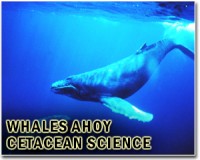| . |  |
. |
Washington DC (SPX) Apr 18, 2011 Humpback whales have their own version of the hit single, according to a study reported online on April 14th in Current Biology, a Cell Press publication. At any given time within a population, male humpbacks all sing the same mating tune. But the pattern of the song changes over time, with the new and apparently catchy versions of the song spreading repeatedly across the ocean, almost always traveling from west to east. "Our findings reveal cultural change on a vast scale," said Ellen Garland, a graduate student at The University of Queensland. Multiple songs moved like "cultural ripples from one population to another, causing all males to change their song to a new version." This is the first time that such broad-scale and population-wide cultural exchange has been documented in any species other than humans, she added. Researchers from The University of Queensland in collaboration with members of the South Pacific Whale Research Consortium made the discovery by searching for patterns in whale songs recorded from six neighboring populations in the Pacific Ocean over a decade. This revealed a striking pattern of cultural transmission as whale songs spread from Australia to French Polynesia over the course of about two years. "The songs started in the population that migrates along the eastern coast of Australia and then moved-just the songs, and probably not the whales-all the way to French Polynesia in the east," Garland said. "Songs were first learnt from males in the west and then subsequently learned in a stepwise fashion repeatedly across the vast region." In fact, only one song ever moved to the west over the period of the study. Garland explained that the almost exclusive movement of songs to the east may be due to population size differences, because the population on the east coast of Australia is very large compared to all others in the area. The researchers suspect that either a small number of males move to other populations, taking their songs with them, or whales in nearby populations hear the new songs while they swim together on migration. Most of the time, songs contain some material from the previous year blended with something new. "It would be like splicing an old Beatles song with U2," Garland said. "Occasionally they completely throw the current song out the window and start singing a brand new song." Once a new song emerges, all the males seem to rapidly change their tune. Those songs generally rise to the "top of the chart" in the course of one breeding season and typically take over by the end of it. Garland said it is not yet known why the humpbacks' songs spread in this way. In fact, why whales sing in the first place isn't fully known. Song is likely a mating display, but it is unclear whether the main effect is to attract females or to repel rival males. Still, Garland suspects that the whales may want to stand out like a new pop song. "We think this male quest for song novelty is in the hope of being that little bit different and perhaps more attractive to the opposite sex," she said. "This is then countered by the urge to sing the same tune, by the need to conform."
Share This Article With Planet Earth
Related Links Cell Press Follow the Whaling Debate
 Japan objects to Sea Shepherd protection for Palau
Japan objects to Sea Shepherd protection for PalauKoror (AFP) April 14, 2011 The Palau government said Friday it was reconsidering its agreement to have the conservation group Sea Shepherd patrol its waters after receiving a counter offer from Japan. President Johnson Toribiong did not identify who was in the Japanese delegation but said they were of "ministerial level" and they described the conservation group as "terrorists". He said the Japanese had offered to ... read more |
|
| The content herein, unless otherwise known to be public domain, are Copyright 1995-2010 - SpaceDaily. AFP and UPI Wire Stories are copyright Agence France-Presse and United Press International. ESA Portal Reports are copyright European Space Agency. All NASA sourced material is public domain. Additional copyrights may apply in whole or part to other bona fide parties. Advertising does not imply endorsement,agreement or approval of any opinions, statements or information provided by SpaceDaily on any Web page published or hosted by SpaceDaily. Privacy Statement |